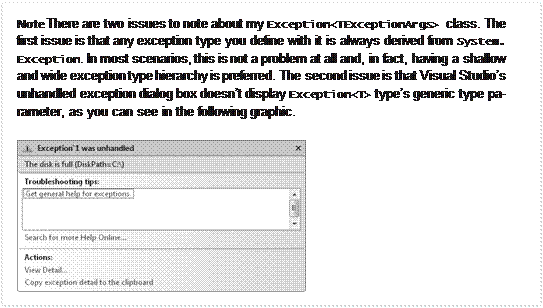
CATEGORIES:
BiologyChemistryConstructionCultureEcologyEconomyElectronicsFinanceGeographyHistoryInformaticsLawMathematicsMechanicsMedicineOtherPedagogyPhilosophyPhysicsPolicyPsychologySociologySportTourism
Nbsp; Defining Your Own Exception Class
Unfortunately, designing your own exception is tedious and error prone. The main reason for this is because all Exception-derived types should be serializable so that they can cross an AppDomain boundary or be written to a log or database. There are many issues related to serialization and they are discussed in Chapter 24, “Runtime Serialization.” So, in an effort to simplify things, I made my own generic Exception<TExceptionArgs> class, which is defined as follows.
[Serializable]
public sealed class Exception<TExceptionArgs> : Exception, ISerializable where TExceptionArgs : ExceptionArgs {
private const String c_args = "Args"; // For (de)serialization private readonly TExceptionArgs m_args;
public TExceptionArgs Args { get { return m_args; } }
public Exception(String message = null, Exception innerException = null)
: this(null, message, innerException) { }
public Exception(TExceptionArgs args, String message = null,
Exception innerException = null): base(message, innerException) { m_args = args; }
// This constructor is for deserialization; since the class is sealed, the constructor is
// private. If this class were not sealed, this constructor should be protected [SecurityPermission(SecurityAction.LinkDemand,
Flags=SecurityPermissionFlag.SerializationFormatter)]
private Exception(SerializationInfo info, StreamingContext context)
: base(info, context) {
m_args = (TExceptionArgs)info.GetValue(c_args, typeof(TExceptionArgs));
}
// This method is for serialization; it’s public because of the ISerializable interface [SecurityPermission(SecurityAction.LinkDemand,
Flags=SecurityPermissionFlag.SerializationFormatter)]
public override void GetObjectData(SerializationInfo info, StreamingContext context) { info.AddValue(c_args, m_args);
base.GetObjectData(info, context);
}
public override String Message { get {
String baseMsg = base.Message;
return (m_args == null) ? baseMsg : baseMsg + " (" + m_args.Message + ")";
}
}
public override Boolean Equals(Object obj) {
Exception<TExceptionArgs> other = obj as Exception<TExceptionArgs>; if (other == null) return false;
return Object.Equals(m_args, other.m_args) && base.Equals(obj);
}
public override int GetHashCode() { return base.GetHashCode(); }
}
And the ExceptionArgs base class that TExceptionArgs is constrained to is very simple and looks like this.
[Serializable]
public abstract class ExceptionArgs {
public virtual String Message { get { return String.Empty; } }
}
Now, with these two classes defined, I can trivially define more exception classes when I need to.
To define an exception type indicating the disk is full, I simply do the following.
[Serializable]
public sealed class DiskFullExceptionArgs : ExceptionArgs {
private readonly String m_diskpath; // private field set at construction time public DiskFullExceptionArgs(String diskpath) { m_diskpath = diskpath; }
// Public readonly property that returns the field public String DiskPath { get { return m_diskpath; } }
// Override the Message property to include our field (if set) public override String Message {
get {
return (m_diskpath == null) ? base.Message : "DiskPath=" + m_diskpath;
}
}
}
And, if I have no additional data that I want to put inside the class, it gets as simple as the following.
[Serializable]
public sealed class DiskFullExceptionArgs : ExceptionArgs { }
And now I can write code like this, which throws and catches one of these.
public static void TestException() { try {
throw new Exception<DiskFullExceptionArgs>(
new DiskFullExceptionArgs(@"C:\"), "The disk is full");
}
catch (Exception<DiskFullExceptionArgs> e) { Console.WriteLine(e.Message);
}
}
 | |||
 | |||
Date: 2016-03-03; view: 804
| <== previous page | | | next page ==> |
| Nbsp; Throwing an Exception | | | Nbsp; Trading Reliability for Productivity |